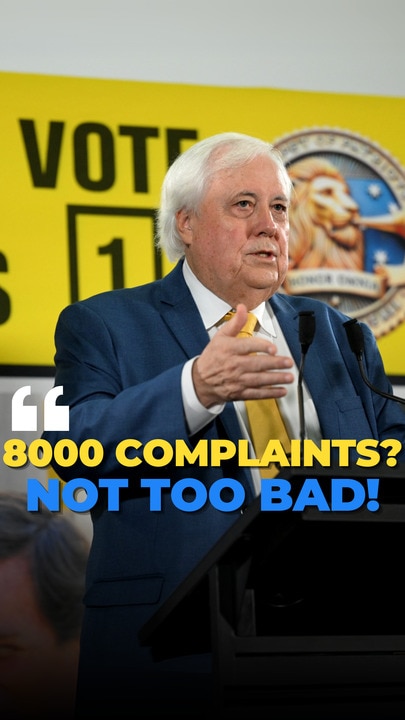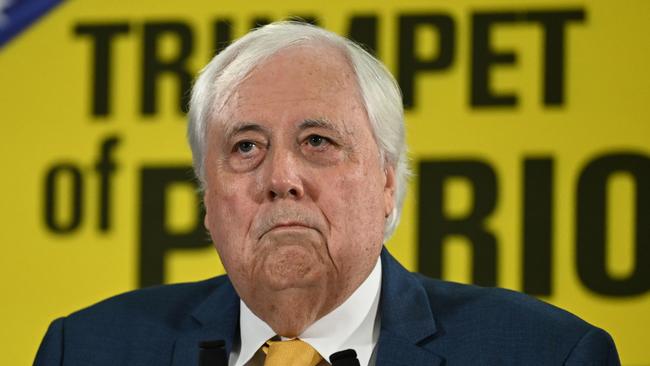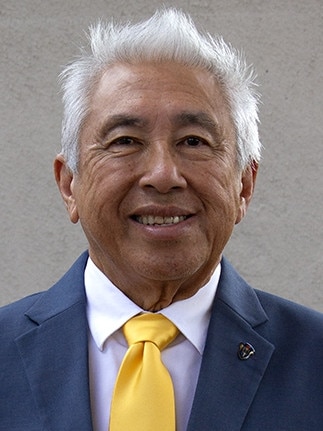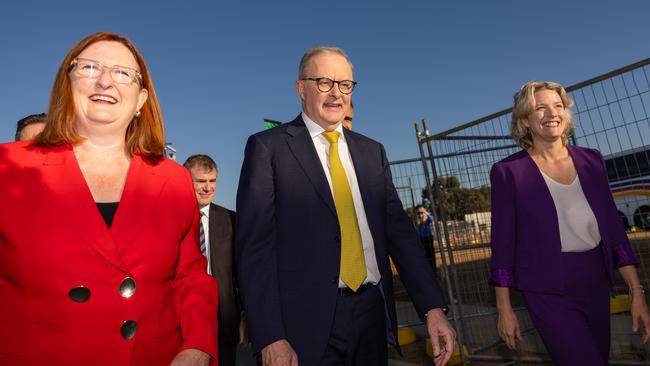Australia’s big political parties can no longer excuse their Spam Act and Privacy Act exemptions | David Penberthy
Clive Palmer’s man behind the phone spam might be the most annoying person in Australia but he’s actually done us a favour, writes David Penberthy. Have your say.

Analysis
Don't miss out on the headlines from Analysis. Followed categories will be added to My News.
Election campaigns are by definition divisive but there is one issue that has emerged this past five weeks on which we are all in passionate agreement – namely that Harry Fong might be the most annoying bloke in Australia.
The lead Senate candidate for Clive Palmer’s Trumpet of Patriots Party is also the man responsible for authorising the estimated millions of unsolicited spam texts that have been sent multiple times to unsuspecting voters ahead of polling day.
Many of you will have received the texts multiple times. One of my wife’s workmates has received 15.
An old friend of mine who now lives in China with whom I hadn’t spoken for years sent me a text out of the blue on Monday saying that despite having been out of the country for 10 years, he’s been woken up in the middle of the night in Guangzhou by incessant messages from the trumpeters.
The level of irritation has been so significant that even the Trumpet of Patriots’ own candidates have spoken out about their annoyance.

In one of the stranger moments of the campaign, local Trumpets candidate Mark Aldridge, who is running in Makin, revealed he had done a reverse Mal Meninga this week.
Rather than quitting politics at the start of the campaign like Meninga did, Aldridge announced at the end of his campaign that he had quit his own party and no longer wanted anything to do with them.
Aldridge said he already had his concerns about the party but that when his own family and friends started complaining about being bombarded with texts it was too much for him to continue.
“That was the pièce de résistance … somebody has been put in the position to run the campaign and they’ve done a terrible, terrible job and they’ve disadvantaged myself and everyone else in the party,” he said.
TELL US MORE IN THE COMMENTS
“It’s kind of like people don’t matter.”
While Harry Fong has clearly annoyed us all – even including his own candidates – he has also done us a massive favour.
He has sparked a national debate about the extent to which political parties should be allowed to override privacy and spam laws so they can get their hands on our personal information.
This is the key point to be made about Harry Fong and the Trumpet of Patriots.
They are not breaking the law. Rather, they are exercising a loophole in the law which was deliberately created by both sides of politics to ensure that the parties can access our information for political gain.


As far as I can tell there is no public policy argument at all for the exemptions our political parties afforded themselves when the Spam Act and Privacy Act passed the parliament.
It is particularly maddening because there are times when as private individuals we now struggle to establish our bona fides with insurers or banks with which we have been dealing for years.
Conversely, the electoral roll, private phone numbers and addresses – all of that is open slather for the political parties to pick through so they can amass the maximum amount of data possible about voters in every electorate and nationwide.
It’s a complete rort, and I reckon the first political party that came along and promised to axe the exemption would be rewarded at the ballot box.
The thing I find so strange about it is why any of them think these tactics are worth using anyway.
Is there anyone in Australia who is so profoundly stupid that they received a text from Harry Fong, or from Labor or the Libs or the Greens, and want: “Well, that’s clinched it. They’ve got my vote!”
It’s as dopey as those poor buggers you see standing on the side of the road holding the now-banned corflutes with the names and faces of their favoured candidate.

Has anyone ever driven past and decided there and then that they’re falling in line behind Nicolle Flint or Louise Miller-Frost because they saw some chambray-shirted Young Liberal or a boofhead organiser from the Transport Workers Union on the side of Cross Road excitedly spruiking their party of choice?
On a serious note, the accessing of information has a more sinister dimension in 2025.
Barely a week passes without a story about a significant security breach with personal information stored by a bank or a telco or an insurer or super scheme.
There is a vast black market in obtaining and trading in personal details, so much so that every reputable company in Australia has been reviewing the amount of personal data they gather, the need to gather such data, and the manner in which the data is stored.
Many major companies have been stung by having their cloud data compromised either through hacking or by sloppiness.
The totally valid public backlash in these cases has resulted in those companies being shamed. It has also forced an industries-wide rethink about the willy-nilly accumulation of data which exposes customers to risk and businesses to bad headlines.
The only people who don’t seem to think it’s a problem are the ones who work in the very centre of Canberra, and are ultimately interested in one thing – winning elections.
A desire to win elections is not a policy argument in favour of letting them access our personal details.
As I said, if there is a public policy argument as to why them having our details its important, I am all ears.
But there isn’t one, and as Harry Fong has demonstrated so well, in 2025 at a time of valid unease about the use of our data, it’s time to revisit this political exemption – and end it forever more.
More Coverage
Originally published as Australia’s big political parties can no longer excuse their Spam Act and Privacy Act exemptions | David Penberthy





